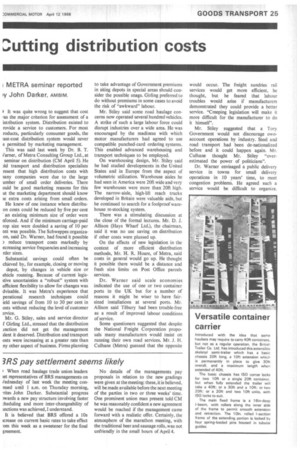utting distribution costs
Page 27

If you've noticed an error in this article please click here to report it so we can fix it.
METRA seminar reported 1y John Darker, AMBIM.
I It was quite wrong to suggest that cost 'as the major criterion for assessment of a istribution system. Distribution existed to rovide a service to customers. For most roducts, particularly consumer goods, the :ast-cost distribution system would never e permitted by marketing management. This was said last week by Dr. B. T. iamer, of Metra Consulting Group Ltd., at seminar on distribution (CM April 5). He 1d transport and distribution specialists resent that high distribution costs with tany companies were due to the large umber of small order deliveries. There ould be good marketing reasons for this ut the marketing department should know re extra costs arising from small orders. He knew of one instance where distribuon costs could be reduced by five per cent an existing minimum size of order were !forced. And if the minimum carriage-paid rop size were doubled a saving of 10 per f.mt was possible. The Schweppes organizaon, said Dr. Warner, had found it possible ) reduce transport costs markedly by ecreasing service frequencies and increasing rder sizes.
Substantial savings could often be chieved by, for example, closing or moving depot, by changes in vehicle size or ehicle routeing. Because of current legisdive uncertainties a "robust" system with ufficient flexibility to allow for changes was dvisable. It was Metra's experience that perational research techniques could ield savings of from 10 to 30 per cent in osts without reducing the level of customer Mr. G. Stiley, sales and service director f Girling Ltd., stressed that the distribution Inchon did not get the management flent it deserved. Distribution and transport osts were increasing at a greater rate than fly other aspect of business. Firms planning to take advantage of Government premiums in siting depots in special areas should consider the possible snags. Girling preferred to do without premiums in some cases to avoid the risk of "awkward" labour.
Mr. Stiley said some road haulage concerns now operated several hundred vehicles. A strike of such a large labour force could disrupt industries over a wide area. He was encouraged by the readiness with which motor manufacturers had agreed to use compatible punched-card ordering systems. This enabled advanced warehousing and transport techniques to be employed.
On warehousing design, Mr. Stiley said he had studied developments in the United States and in Europe from the aspect of volumetric utilization. Warehouse aisles he had seen in America were 2011 wide and very few warehouses were more than 20ft high. The narrow-aisle, high-lift reach trucks developed in Britain were valuable aids, but he continued to search for a foolproof warehouse re-stocking system.
There was a stimulating discussion at the close of the formal lectures. Mr. D. J. Allison (Hays Wharf Ltd.), the chairman, said it was no use saving on distribution if other costs were plussed up.
On the effects of new legislation in the context of more efficient distribution methods, Mr. H. R. Hoare, of Metra, said costs in general would go up. He thought it possible there would be a distance and fresh size limits on Post Office parcels services.
Dr. Warner said scale economies indicated the use of one or two container ports in the UK but for a number of reasons it might be wiser to have fairsized installations at several ports. Mr. Allison said Tilbury had been trouble-free as a result of improved labour conditions of service.
Some questioners suggested that despite the National Freight Corporation proposals many manufacturers would insist on running their own road services. Mr. J. H. Culhane (Metra) guessed that the opposite would occur. The freight sundries rail services would get more efficient, he thought, but he feared that labour troubles would arise if manufacturers demonstrated they could provide a better service. "Creeping legislation will make it more difficult for the manufacturer to do it himself".
Mr. Stiley suggested that a Tory Government would not discourage ownaccount operations by industry. Steel and road transport had been de-nationalized before and it could happen again. Mr. Culhane thought Mr. Stiley "overestimated the power of politicians".
Dr. Warner envisaged a public delivery service in towns for small delivery operations in 10 years' time, to meet congestion problems. He agreed such a service would be difficult to organize.




































































































